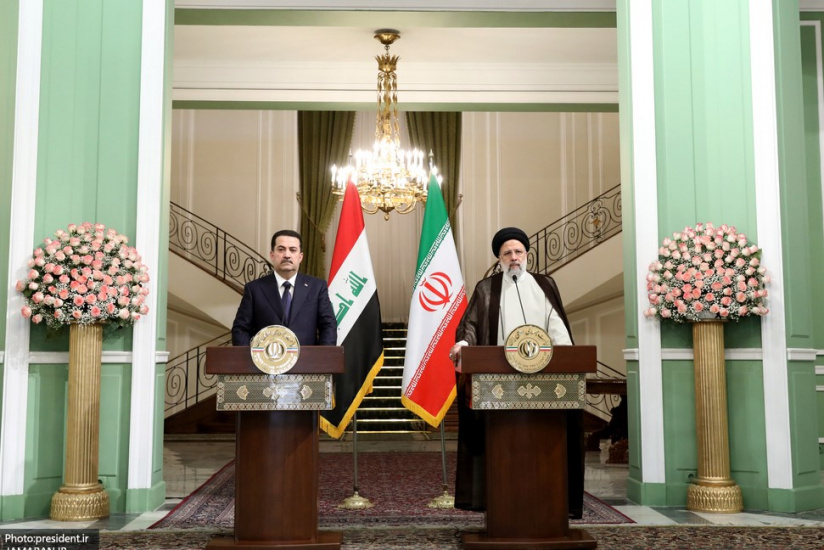Sudani's trip to Tehran to tackle Iran's concerns

The importance that Iran gave to the visit of Mohammad Shia al-Sudani, the Prime Minister of Iraq, shows the status and importance of the Iraqi politician and his government for Iran. Of course, in the period after the fall of Saddam Hussein, relations between Iran and Iraq have always been at the level of two close allies, even when Mustafa Al-Kazemi became the prime minister and many in Iran did not trust him a as a close friend of the Islamic Republic. The rise of al-Sudani is the coming to power of a long-time friend of Iran in Baghdad, especially that Nouri al-Maliki, the former prime minister of Iraq, whom Iran considers the closest person among the Iraqi political leaders, has a grip over the whole government. Al-Sudani himself comes from a party whose ties with Iran are deep-rooted and go back to the era before the fall of Saddam Hussein. The warm reception given by Ebrahim Raeesi, the President of the Islamic Republic of Iran, and Supreme Leader Ayatollah Khamenei, shows what a high place he has for Tehran.
Apart from the need to strengthen the relations between the two countries, Sudani's trip had a special focus, and that is the issue of the security of Iran's western borders in the Kurdistan region. Tehran believes that the Kurdish separatist terrorist groups have armed activities in the western regions of the country and are considered a security threat. During the Al-Kazemi period, when this issue became public and Iran attacked bases in the Kurdistan region, Al-Kazemi government was upset with Iran carrying out countermeasures and insisted that Tehran coordinate with Baghdad. On the other hand, because he was involved in establishing himself for his second term as prime minister, al-Kazemi did not take any effective action, mostly occupied with gaining the support of the Kurdistan region rather than paying attention to Iran's pressures. The Iranian party has repeatedly said that they have provided documents proving of the presence of the terrorist forces to the Iraqi parties with no effective response. Now it seems that Al-Sudani is paying special attention to these documents and wants to remove Iran's concern. In particular, Iran insists that if the Kurdistan Region and Baghdad do not want to take necessary measures, it will have to take action to defend its own security.
It seems that Baghdad has now reached a solid agreement with Erbil to practically solve Iran's concern. For this reason, there has been talk about the deployment of Iraqi military forces along the 200-kilometer border strip between Iran and Iraq in the Kurdistan region, what Tehran was looking for from the beginning. Iran believes that the authorities of the Kurdistan Region and their military forces have a bond with Kurdish separatist groups which stops them from taking action. It is from Iraq and it is the duty of the Iraqi forces to secure the borders.
But besides security concerns, Iran's energy export to Iraq was also raised during this trip. According to a bilateral agreement, Iran should seamlessly export gas to Iraq to be used in Iraq's power plants. Iraq is partially dependent on importing gas from Iran to supply its electricity needs. During recent years, whenever Iran's domestic gas consumption has increased, the amount of Iran's gas exports to Iraq has been vut which is contrary to Iran's obligations in its gas contract with Iraq. In the meantime, there is also the issue of transferring money for imported gas from Iraq to Iran, which is carried out with snail pace and with difficulty due to US sanctions. Iraq insists that a solution should be found for this issue and that Iran should not fail to supply gas to Iraq. During Al-Sudani's visit, it was agreed to define a mechanism for the settlement of accounts between Iran and Iraq, and also to establish a representative office of the Iranian Ministry of Petroleum in Baghdad in order to improve the level of cooperation. In this way, both parties hope that they can reach a permanent solution in the face of this prolonged economic problem.
Al-Sudani chose Iran for his first trip to a non-Arab country to show Iran's position in Iraq's foreign policy. Although during a short period at the beginning of his premiereship, he held frequent meetings with the US ambassador, but his trip to Tehran also sends this message to the Americans that from Baghdad cannot ignore Iran and its concerns.

